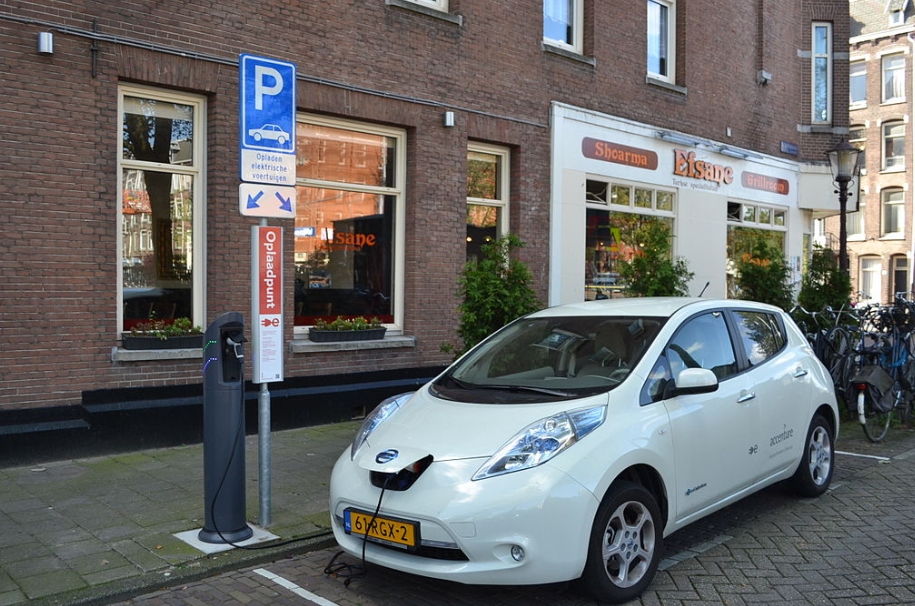Two opinions from Silicon Valley were quite
popular in Twitter recently. One is: “With Uber, there is no need to buy a car.”

Source: Bing
But soon, with the launch of Tesla, the
above opinion became “I bought a Tesla Model X.” Owning a Tesla virtually
became a symbol of the “Silicon Valley elites”.
Not only in Silicon Valley, electric
vehicle is actually very popular all over the world. For example, Norway’s political
parties have reached a deal to ban gas-powered car sales by 2025.
The popularity of electric vehicle is attributed
to the subsidies policies from the governments in the globe. Some states in the
US offer additional tax incentives for electric vehicles. California brings the total credit
up to USD10,000, and Colorado to USD13,500—more than the base price of a brand
new Ford Fiesta.
Recently, the Netherlands Parliament put
forwards a motion calling on the country to ban sales of new petrol and
diesel cars starting in 2025, according to theguardian.
In addition, over 20 governments in the
world are offering subsidies to those who buy electric vehicles. The Norway government
even offered about USD616.7 million in tax subsidies for electric vehicles.
Compared to other countries’ subsidy policies
for the electric vehicles’ owners only, China’s policies on promoting electric
vehicles seem more encouraging.
In 2012, the Chinese government released
the Development Plan on Alternative
Energy Vehicle Industry (2012-2020), aiming that by 2020, the production of
pure electric vehicles and plug-in hybrid electric vehicles shall reach 2
million per year and the total sales volumes shall reach 5 million.
However, the debate about “is electric
vehicle more environmental friendly” is not even over yet.
Carbon dioxide emitted by petrol vehicles
is always regarded as the culprit of the greenhouse effect by different
governments and environment organizations. That’s why emission-free electric
vehicles look much more environmental friendly.
However, we could not tell whether electric
vehicles would pollute the environment only based on the electric vehicle
itself.
Pollution is relevant to how energy is
produced
We should discuss based on different situations
when we are talking about whether electric vehicles are environmental friendly. Neil Winton, Forbes’s contributor
for Europe’s car manufacturers, mentioned that only when the electricity
for electric vehicles comes from clean and renewable energy can the electric
vehicles really save the earth.
During the travelling of electric vehicles,
it doesn’t cause pollution indeed. However, the production process of electric
energy used in electric vehicles is possible to pollute the world, because most
of the power stations in the world produce electricity using coals and petrol.
Only 22.8% of the energy that used to
produce electricity is renewable energy in the world, according to CCM’s research.
In 2014, two-thirds of the electricity in
the US is produced using fossil fuel and 39% of electricity energy produced by
the fossil fuel came from coal-fired
power plants, according to U.S. Energy Information Administration.
Virginia McConnell, economist from Resources
for the Future, an environment research company, believed that if the
electricity for Tesla comes from coal-fired
power plants, then the electric vehicles don’t emit less greenhouse gases than
that from traditional petrol vehicles.
A calculation from Singapore Land
Transportation Authority even considered Tesla Model S as a non-environmental-friendly
car. If we convert the power consumption as carbon emission, Tesla Model S
emits 222 kg carbon dioxide per kilometer. In March this year, an owner of
Tesla Model S in Singapore was fined USD10,880 for over emission.
In fact, only when the electricity comes
from clean and renewable energy can the electric vehicles benefit the
environment. For example, the electric vehicles in Europe like France could do
no harm to the environment because 80% of the electricity is produced by
nuclear energy.
Electricity in China is less
environmental friendly
As for China, the electricity is mainly
produced by coal burning.
In 2014, coal accounted for 64% of the
total energy consumption in China. Bernstein Research, sell-side research firm,
did a research on how electric vehicles traveled in Hong Kong affected the
environment and the research team believed that the high carbon-emitting electricity
production in China actually caused more pollution to the earth.
Bjorn Lomborg, former director of the
Danish government's Environmental Assessment Institute in Copenhagen,
had estimation and found out that the consumed electricity when Tesla Model S
travels 150,000 kilometers would bring 13 tonnes of carbon emission.
In fact, calculated with the carbon
emission from the production and recycle of li-ion battery, it would emit 34
tonnes of carbon in total, which is almost the same as the 35 tonnes of carbon
emission when Audi A7 travels 150,000 kilometers using diesel.
Compared with petrol vehicle, the result
doesn’t look good either. According to Neil Beveridge, researcher from Bernstein
Research, considering how China produces electricity, electric vehicles emit
20% more carbon than petrol vehicles when Neil compared BMW 320i with Tesla
Model 3 with the mileage of 93,000 miles traveling in Hong Kong.
However, official spokesman of Tesla demurred
and believed that the actual emission of carbon dioxide was 137g every kilometer
when Tesla Model 3 traveled in Hong Kong, which was much lower than the
emission from petrol vehicles, after Tesla did some research on Bernstein’s
data.
However, Tesla still has no response to the
question whether electric vehicle was environmental friendly in the area with
non-clean energy.
In addition, the batteries weight of Tesla
Model S is over half a tonne, with the bulk much larger than what electronic
products recycle equipment can handle. It takes time to improve the recycle
technology and few companies are good at recycling li-ion batteries in the
world.
“Incentive effects”
Besides the figures, the “incentive effects”
for the car owners also have negative influence on the environment.
What’s “incentive effect”?
Steven E. Landsburg, professor of Economics
at the University of Rochester, questioned about whether saving energy equals
to environmental protection: “When energy-saving vehicles are considered as a
vehicle to lower the driving cost, people prefer to drive when going outside.”
The price of electric vehicles may not be
lower but the driving cost is. In addition, the incentives from the governments
are also encouraging people to drive more.
Take Hong Kong as an example, people have
to pay 36% of purchase tax when buying petrol vehicles but no tax for electric
vehicles.
In Beijing, the government provides about
USD4,780-USD8,195 subsidy for electric vehicles. Besides, there are no policy
limitations on getting the license plates.
With all these encouraging policies, those
who seldom drive or take public transportation may be more likely to drive
after buying electric vehicles.
It takes time to make the energy into clean
energy. According to the 13th Five Years Plan in China, the
consumption of coal would reach 62% of the total energy consumption in China in
2020, according to CCM’s research.
Bjorn Lomborg was quite frank and honest
about the subsidy for electric vehicles in China: “Based on how China produces
electricity, it is meaningless for the government to subsidize electric
vehicles.”
If you are looking for more information
about electric vehicle market in China, you could click electric
vehicle, li-ion
battery or search what you want in CCM’s Online
Platform.

About CCM:
CCM is the leading market intelligence provider for China’s
agriculture, chemicals, food & ingredients and life science markets.
Founded in 2001, CCM offers a range of data and content solutions, from price
and trade data to industry newsletters and customized market research reports.
Our clients include Monsanto, DuPont, Shell, Bayer, and Syngenta. CCM is a
brand of Kcomber Inc.
For more information about CCM, please
visit www.cnchemicals.com or get in touch with us
directly by emailing econtact@cnchemicals.com or calling
+86-20-37616606.